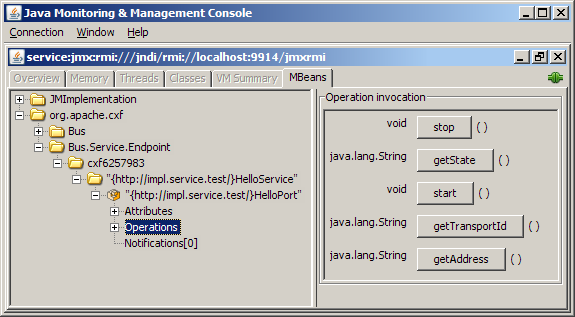Configuring JMX IntegrationTo enable JMX integration, register an InstrumentationManager extension with the CXF bus. Using Spring XML on Tomcat, the following minimal XML snippet will enable JMX integration. <import resource="classpath:META-INF/cxf/cxf.xml"/> ... <bean id="org.apache.cxf.management.InstrumentationManager" class="org.apache.cxf.management.jmx.InstrumentationManagerImpl" init-method="init"> <property name="enabled" value="true" /> <property name="bus" ref="cxf" /> <property name="usePlatformMBeanServer" value="true" /> </bean> The default InstrumentationManager accepts the following configuration options:
Before CXF 3.4.0, the following options were also available. From CXF 3.4.0, these options are removed, as there is no real advantage to creating a custom JMX local Connector. Local JMX monitoring can be done using standard tools, and remote JMX monitoring is done using the standard JVM JXM options (see below).
The MBean instrumentation provided by the above configuration will provide generic information about the WSDL supported by the web service as well as web service administration commands. To see performance metrics of the SOAP call processing, further configuration is required – these are disabled by default to avoid unnecessary runtime overhead. If you're using Maven, make sure you have the following dependency added to the pom.xml for the web service provider: <dependency>
<groupId>org.apache.cxf</groupId>
<artifactId>cxf-rt-management</artifactId>
<version>${cxf.version}</version>
</dependency>
Example ConfigurationEnable JMX integration by adding the following XML to your CXF Spring context. <bean id="org.apache.cxf.management.InstrumentationManager" class="org.apache.cxf.management.jmx.InstrumentationManagerImpl" init-method="init"> <property name="bus" ref="cxf" /> <property name="enabled" value="true" /> <property name="usePlatformMBeanServer" value="true" /> </bean> Starting from 2.5.2, an equivalent configuration of the above instrumentation manager can be directly made within the bus configuration using the corresponding property names having the "bus.jmx" prefix, as in
<cxf:bus bus="cxf">
<cxf:properties>
<entry key="bus.jmx.enabled" value="true" />
<entry key="bus.jmx.usePlatformMBeanServer" value="true" />
</cxf:properties>
</cxf:bus>
To test the configuration start up your service and connect to it by using JConsole from the JDK. Then you can browse to your endpoint: Remote accessRemote access to JMX is configured using the standard JVM JMX options. For example if you want to enable remote access without enabling TLS, but using authentication against local access and password files: -Dcom.sun.management.jmxremote -Dcom.sun.management.jmxremote.port=9913 -Dcom.sun.management.jmxremote.ssl=false -Djava.rmi.server.hostname=localhost -Dcom.sun.management.jmxremote.access.file=conf/jmx.access -Dcom.sun.management.jmxremote.password.file=conf/jmx.password Then you can connect using jconsole specifying either of the following for the remote process, and supplying a username + password to match what you have configured:
Configuring CXF to Use the ServiceMix 4 MBeanServerIf you are embedding a CXF service in a ServiceMix 4 container, the configuration is slightly different from above. You don't want to start a new MBeanServer and you probably don't want to create additional connectors as the container manages both of these for you. You can get a reference to the container's MBeanServer through the OSGi framework and inject this reference into the JMX integration extension. Don't forget to add the Spring OSGI namespace and schemaLocation to your CXF configuration file if they are not already present.
<!-- OSGi namespace and schemaLocation required -->
<beans ...
xmlns:osgi="http://www.springframework.org/schema/osgi"
...
xsi:schemaLocation="...
http://www.springframework.org/schema/osgi http://www.springframework.org/schema/osgi/spring-osgi.xsd">
...
<!-- Grab a reference to the current MBeanServer -->
<osgi:reference id="mbeanServer" interface="javax.management.MBeanServer" cardinality="0..1"/>
<bean id="org.apache.cxf.management.InstrumentationManager"
class="org.apache.cxf.management.jmx.InstrumentationManagerImpl">
<property name="bus" ref="cxf" />
<property name="enabled" value="true" />
<!-- Inject the reference to the MBeanServer -->
<property name="server" ref="mbeanServer" />
</bean>
How to get web service performance metrics (Request/Response time, number of calls, etc.)?The CXF management module also provides a feature (the Performance.Counter.Server MBean) which provides aggregate statistics for services running in the CXF Bus. It is not enabled by default to avoid unnecessary runtime overhead during web service call processing. Here is the configuration snippet that you should add to your Spring context file to be able to view this information:
<!-- Wiring the counter repository -->
<bean id="CounterRepository" class="org.apache.cxf.management.counters.CounterRepository">
<property name="bus" ref="cxf" />
</bean>
The CounterRepository collects the following metrics: invocations, checked application faults, unchecked application faults, runtime faults, logical runtime faults, total handling time, max handling time, and min handling time. Note a SOAP call will need to occur against the web service before you will see the MBean within your JMX monitoring software. |


